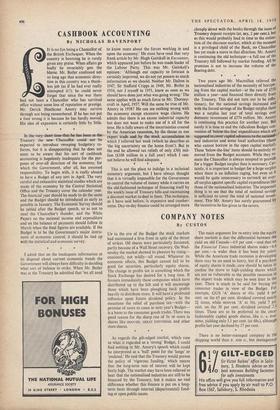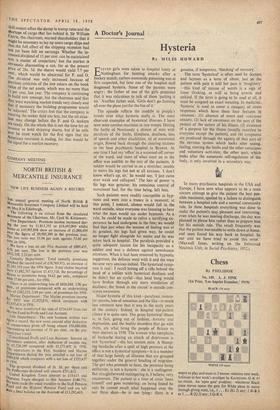COMPANY NOTES
By CUSTOS UP to the eve of the Budget the stock markets had maintained a firm front in spite of the threat of strikes. Oil shares were particularly favoured, partly because of a Wall Street recovery. On Wed- nesday the market showed its pleasure by rising— cautiously, not wildly—all round. Whatever its economic effects, this Budget cannot fail to be good for securities, particularly equity shares. The change in profits tax is something which the Stock Exchange has desired for a long time. It favours immediately those companies which have distributed up to the hilt and it will encourage those which have been ploughing back profits heavily to distribute more. It will have a profound influence upon future dividend policy. In the meantime the relief of purchase tax—with the promise of more to come in next year's Budget— is a boon to the consumer goods trades. There was good reason for the sharp rise of 3s. or more in shares like HOOVER, GREAT UNIVERSAL and other store shares.
* * * As regards the gilt-edged market, which rose to what it regarded as a 'strong' Budget, I could find nothing in Mr. Amory's speech which could be interpreted as a 'bull' point for the 'longs' or `undated.' He said that the Treasury would pursue the policy of 'vigorous funding,' which means that the long-term rate of interest will be kept fairly high. The market may have been relieved to hear that the nationalised industries are still to be financed by the Treasury, but it makes no real difference whether this finance is put on a long- term basis through internal (departmental) fund- ing or open public issues.
The main argument for re-entry into the equity share markets is that the differential between the yield on old Consols-4.9 per cent.—and that on the Financial Times industrial shares index-6.6 per cent.—is wider than it has been for years. While the American trade recession is developing there may be no need to hurry, but if a purchase of equity shares is made, care should be taken to confine the move to high-yielding shares which are not so vulnerable to the possible recession in the export trade which may be seen later in the year. There is much to be said for buying the consumer trades in view of the Budget. For example, GUS 'A' shares at 41s. yield 8 per cent. on the 65 per cent. dividend covered nearly 24 times, while HOOVER `A' at 36s. yield 7 per cent. on the 50 per cent. dividend covered 2.4 times. These are to be preferred to the once- fashionable capital goods shares, like c. A. PAP• SONS, yielding only 3.1 per cent. (at 48s.), although profits last year declined by 17 Per cent.
* * *
There is no better-managed company in the shipping world than P. AND o., but management skill cannot offset the slump in tramp rates and the shortage of cargo that lies behind it. Sir William Currie, the chairman, warned shareholders that it might be necessary to lay up more cargo ships and that the full effect of the shipping recession had not yet been felt on earnings. Whether the in- creased dividend of 11 per cent, can be maintained was 'a matter of conjecture,' but the market is obviously discounting a cut, for at the present price of 28s. 3d. the shares would yield 7.7 per cent., which would be abnormal for P. and 0. The dividend was only increased because of previous criticism of the low return on the book value of the net assets, which was no more than I per cent. last year. The company is continuing to build new tonnage, but the chairman said that they were watching market trends very closely and that if necessary the building programme would be 'adjusted.' The critics feel that the company is entering the tanker field too late, but the oil situa- tion may change before the P. and 0. tankers are ready. On the whole this is not the time for an Investor to hold shipping shares, but if he sells now he must watch for the first signs that the American recession is ending, for that would be the signal for a market recovery.





























 Previous page
Previous page